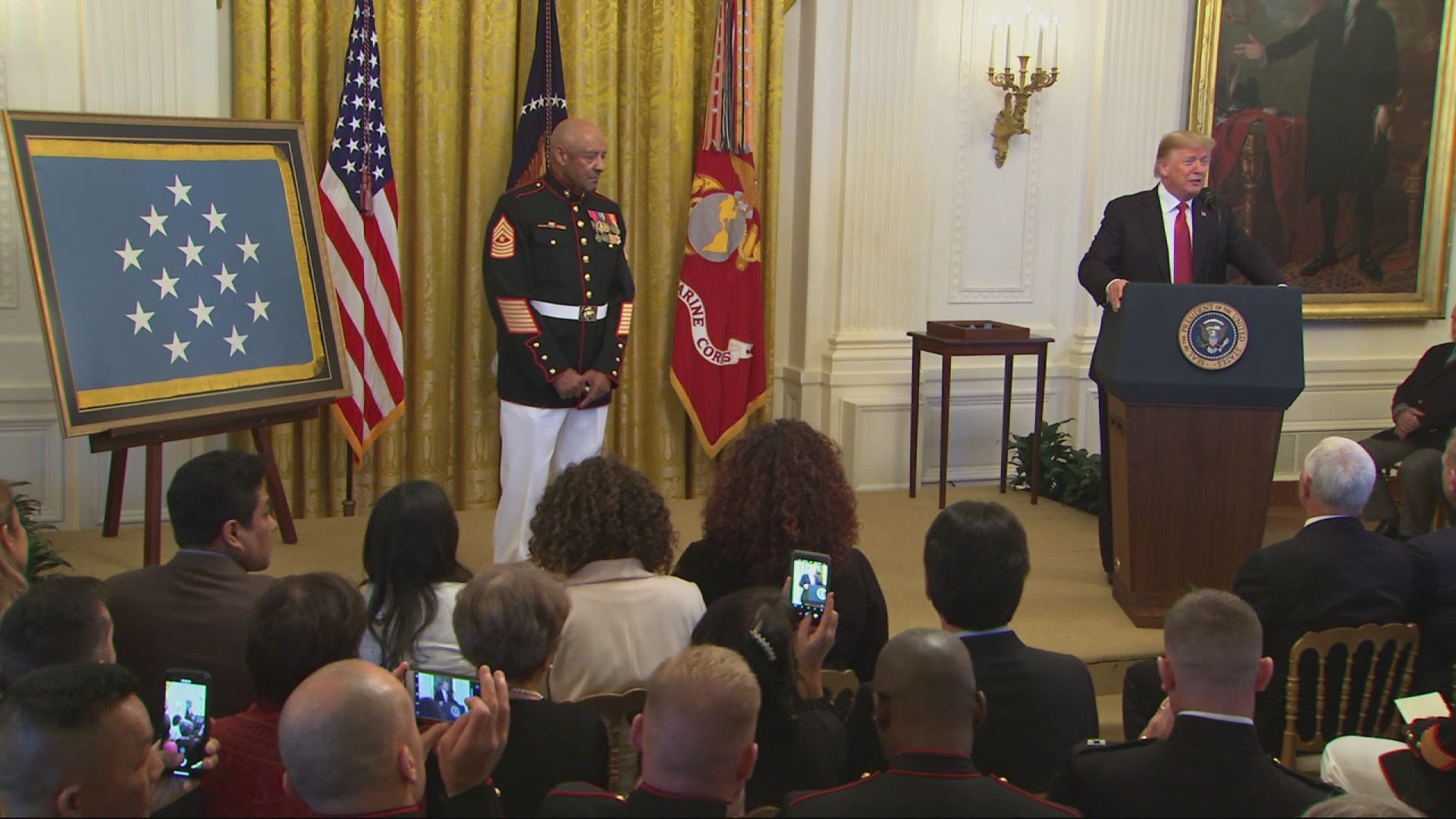WASHINGTON — Marine Sgt. Maj. John Canley’s astounding heroism in Vietnam 50 years ago speaks for itself, so loudly that Wednesday he’ll be awarded the Medal of Honor by President Donald Trump at a White House ceremony.
Canley's daughter Patricia Sargent knows how her father took command of the undermanned Company A, First Battalion, First Marines despite shrapnel wounds during the bloody battle of Hue in 1968. How he set up a base while caught in a “deadly crossfire,” drew fire by darting into the open so his Marines could seize a building and carried wounded Marines to safety while exposing himself to the enemy.
"Then-Gunnery Sergeant Canley’s heroic actions saved the lives of his teammates," according to the White House.
She and Canley spoke about the recognition and the qualities he has that helped him earn it during an interview with USA TODAY. When Sargent talked to Marines gathering at hotel near the Pentagon to honor Canley, a smaller story stood out and illuminated what made Canley a transcendent leader.
Canley had told a grimy, young Marine in the field that he need to clean up. So, the young man just out of high school filled a helmet with water, dipped in his razor and went at it.
“My dad said to him, ‘Hey, hey. You’ve got to wash your face off and warm it up to get it soft before you shave,’” Sargent said.
The old Marine told Sargent recently he still thinks about that moment.
“Something as little as that,” the Marine told her. “But I was 18 years old. I didn’t know how to shave. He taught me that. Not only did I follow him and he saved my life and all these things. But he taught me those life lessons.”
Canley seems uncomfortable with the attention being lavished on him. He prefers to talk about the Marines who served with him, people like John Ligato, the retired FBI agent who has advocated since 2005 for Canley to receive the nation's highest military honor.
The battle for control of Hue was one of the bloodiest of the war. North Vietnamese soldiers and guerrillas had overrun the provincial capital during the Tet Offensive. Canley and his Marines, outnumbered and outgunned, were sent to retake the city. After the battle, legendary for its bloody house-to-house fighting, Canley received the Navy Cross, two Bronze Stars and the Purple Heart.
To Canley, the young Marines who served in Vietnam are heroes. Heroes who suffered from bad leadership, shoddy packs and belts, and a lack of relevant training. Canley, who is African-American, said race wasn’t an issue.
“We didn’t have a race problem,” he said. “We had a leadership problem. Period.”
Canley, originally from Caledonia, Arkansas, has received many words of praise from local politicians.
Congressman French Hill (AR-02) issued the following statement:
“Sergeant Major Canley didn’t run away from danger, but towards it. Though wounded, he put himself directly in the line of enemy fire to protect his fellow Marines - placing the lives of his comrades in front of his own. I’m pleased that the president presented Sergeant Major Canley today with the well-deserved Medal of Honor for his service, patriotism, and display of selfless leadership.”
Congressman Westerman also issued his statement Wednesday afterrnoon:
“Sergeant Major John Canley – a native of Caledonia, Arkansas – represents the very best of Arkansas. His actions in Vietnam saved the lives of many of his fellow Marines in the face of extraordinary odds. I can think of no one more deserving of the Medal of Honor than Sgt. Maj. Canley and I extend the gratitude of the entire Fourth Congressional District for his bravery 50 years ago.”
The gathering in Washington is an opportunity to renew acquaintances with Marines that Canley, 80, has known since 1955.
“I’ve received a number of calls, letters thanking me for being their leader,” he said. “That’s an awesome feeling.”
Sargent said her father’s informal classes on leadership continue to this day.
“It’s about the individual. And whether it’s teaching things to them or getting obstacles out of their way so they can achieve other things. I think that’s been his life’s work. He’s done that for Marines. He’s done that for myself, my brother and sister. Now I see him passing those little snippets on to his grandkids.
"I'm very proud of him."
The Associated Press contributed to this story.

